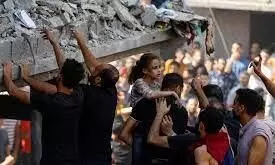
700 Palestinians killed in one day, Gaza records highest 24-hour death toll as Israeli air strikes continue
text_fieldsGaza: The Gaza Strip witnessed its highest 24-hour death toll on record, with over 700 Palestinians killed in overnight Israeli air strikes, said Gaza's health ministry.
This surge in casualties has further intensified the international call for unhindered humanitarian aid to reach the beleaguered region.
Since October 7, over 5,791 Palestinians have been killed due to Israeli bombardments, including 2,360 children. Shockingly, 704 deaths occurred in just the last 24 hours, making it the deadliest day in two weeks of Israeli airstrikes, reported Reuters.
Hospitals in Gaza are overwhelmed, and patients are showing signs of diseases related to overcrowding and poor sanitation, as over 1.4 million people have been forced to flee their homes due to Israel's extensive bombing campaign.
While the Israeli military claimed to have targeted more than 400 Hamas installations and killed numerous fighters during the night, it stressed the need for time to dismantle Gaza's ruling Islamist group entirely.
As the Israeli-Palestinian conflict enters its third week, Gaza's already dire humanitarian situation has reached a catastrophic level. International aid agencies are sounding the alarm, emphasising the urgent need for humanitarian assistance in the enclave. United Nations agencies are appealing for emergency aid to be allowed into Gaza without hindrance, citing the necessity for over twenty times the current aid levels to support the Palestinian population following weeks of relentless Israeli bombardments.
The World Health Organization (WHO) has made another desperate plea for an immediate humanitarian ceasefire to enable the safe delivery of aid.
However, despite growing international concerns and diplomatic efforts to reach a ceasefire, the situation remains grim, with no prospects of a resolution in sight.
The conflict's human toll is undeniable. And the situation is dire, with Israeli tanks and troops amassed at the border, awaiting orders for a potential ground invasion. Such an operation is complicated by fears for the welfare of hostages and the heavily armed militants entrenched in urban settings using a vast network of tunnels.
The availability of food, clean water, medicine, and fuel is dwindling rapidly in Gaza. Residents describe horrifying scenes, such as the Israeli missile strike on a petrol station in Khan Younis, where people gathered to charge their devices and collect water. A resident told Reuters that they were bombed while they slept, resulting in numerous casualties.
In the midst of this dire situation, the question of when or if Israel will launch a full-scale invasion of Gaza remains uncertain. The Israeli military faces a formidable adversary in Hamas, which has built a substantial arsenal with the assistance of Iran. The international community is deeply concerned that the conflict could escalate regionally, leading to even more significant challenges.
World leaders have called on Israel to exercise restraint while affirming its right to self-defence.
However, achieving a peaceful resolution to the Israeli-Palestinian conflict is challenging, with Palestinian aspirations for an independent state in Israeli-occupied territory growing increasingly distant. In the West Bank, deadly clashes have intensified, and tensions have flared along the border between Israel and Lebanon's Iran-backed Hezbollah.
The fear of a regional escalation is underscored by the presence of Iran's network of proxies in Syria, Iraq, and Yemen, raising concerns about the region's stability and its importance to global energy supplies.
Consequently, the United States is taking steps to protect its troops in the Middle East, amid mounting concerns about attacks by Iran-backed groups, and is prepared for the evacuation of military families if necessary.























